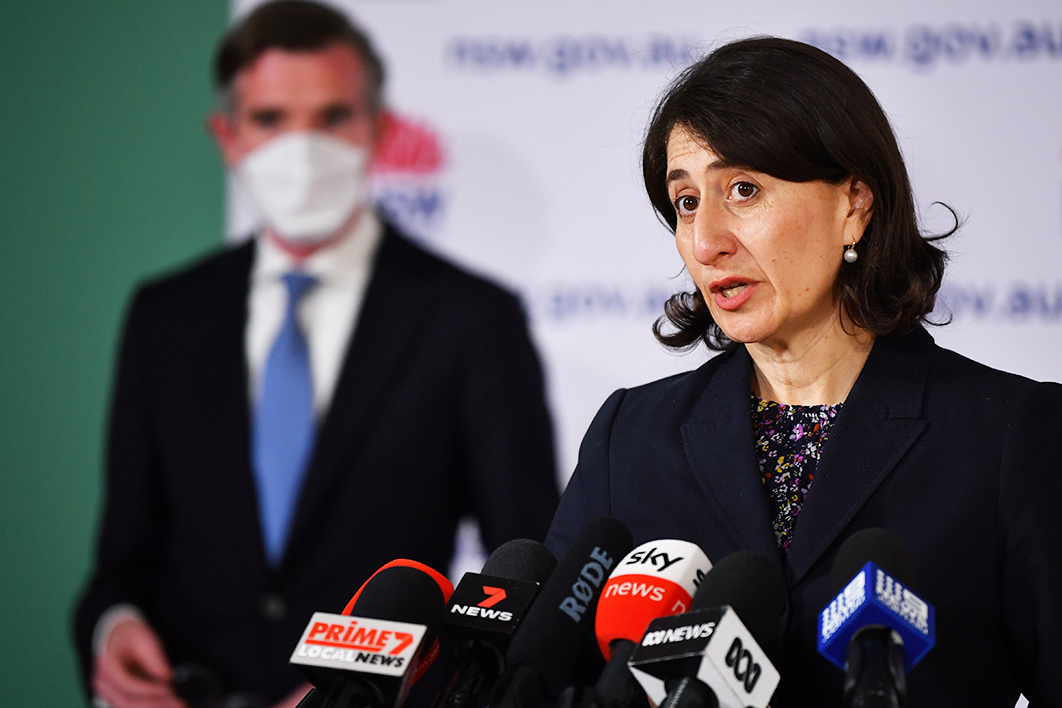The reaction to Gladys Berejiklian’s sudden resignation as NSW premier is one of many recent indications that the assumptions of the male-dominated political culture of the twentieth century remain largely unchallenged. In part, to be sure, the shock and disappointment at her departure would be expected from partisans who supported her policies on Covid and other issues and were keen to overlook or minimise financial scandals. But the view that she is an honest woman brought undone by her entanglement with her corrupt former lover, Darryl Maguire, has been strikingly persistent.
This view is entirely at odds with Berejiklian’s public record. In Australia, as in most countries, pork-barrel politics is an entrenched practice. But, as the Marquis de la Rochefoucauld put it, hypocrisy is the tribute vice pays to virtue. Governments have typically pretended to allocate funds on the basis of community need, and ministers have lost their jobs when the rorts have become too obvious.
Berejiklian’s government, by contrast, has stood out for its brazen embrace of practices bordering on corruption. Prior to his own surprise resignation, her deputy premier happily referred to himself as John Pork-barrel-aro. Berejiklian defended as normal politics her government’s $250 million Stronger Communities Fund, in which 95 per cent of the grants went to Coalition electorates, mostly on the nomination of the local member.
At this stage, ICAC’s investigation is no more than that, and it is entirely possible that Berejiklian will be cleared of any wrongdoing. But the idea that this tough and ruthlessly effective politician should be granted a plea of diminished responsibility on the basis that she was led astray by love is as absurd as it is patronising. It’s hard to believe that such a view would have any currency if the genders were reversed.
Another example of the persistence of twentieth-century ideas is the decision, a few weeks ago, to honour Dr Brendan Murphy with the title of Father of the Year. In his capacity as chief medical officer and then head of the health department, Murphy played a central (if inevitably controversial) role in the national effort against Covid, and no one would be surprised to see him honoured in various ways as a result. But there is little on the public record to support the view that he stands out as “a distinguished father who has demonstrated support, guidance and love to his children or other children through his working role or family life.”
Murphy is known to be a private person, and a profile by the online news site Crikey reported his love of opera, red wine and single malt whisky, making brief mention of his two sons, Ben and Alex, both in their thirties. The Father of the Year citation is a little more forthcoming, including a picture of Murphy with his sons and his year-old granddaughter, along with some generic, though doubtless sincere, sentiments about fatherhood. This is par for the course. The award is routinely given to men in their sixties or beyond whose children have long reached adulthood and whose working roles (for example, as politicians or military leaders) are not particularly associated with the provision of support, guidance and love to children.
We seem at least to have avoided a repetition of the fiasco in which Bob Hawke received the Victorian Father of the Year only to have it publicly disputed by his then wife, Hazel. And that was not the worst. In 1959, the Queensland inaugural Father of the Year award was given to the childless and notoriously corrupt police commissioner Frank Bischof.
If the criteria were taken seriously, the award would be given, every year, to a man whose contributions to the public good were obscured by the fact that any time he might have spent in the limelight was instead devoted to his family. This wouldn’t be difficult. For twenty-five years, the less prominent Mother of the Year award was given to a woman nominated by her own children. (Barnardo’s, which created the award, announced this year that it would end because of the resource pressures created by Covid.) In recent years, the Father’s Day Council has followed this example with a Community Father of the Year, though it receives far less attention.
A third example of lingering twentieth-century attitudes is the use of the “pub test” as a criterion for the credibility of political claims. The implied image is of discussion among (mostly male) drinkers at a public bar. Although a large number of Australians enjoy a pub meal from time to time, only a small minority go to pubs to drink with any regularity. There is no reason to think that the opinions of this minority are either representative of the public as a whole or the product of down-to-earth realism.
A much more representative and gender-balanced sample of the population goes to cafes, and many of them discuss the events of the day there, but no one would ever think of referring to the cafe test. Indeed, the only cafe reference common in Australian politics is to the dreaded cafe latte, allegedly consumed only in the inner city.
The masculinist assumptions that underlie most political analysis in Australia are spelt out in Lech Blaine’s recent Quarterly Essay, Top Blokes: The Larrikin Myth, Class and Power. Blaine does a nice job of unpicking the blokey personas of political leaders like Hawke, Anthony Albanese and Scott Morrison (with John Howard as an exception that proves the rule). His central focus is the shift in masculine support from Labor to the conservative parties.
The conservative capture of the “bloke vote” is an Australian manifestation of a global trend, and a reversal of the old gender gap. In the twentieth century, it was women who were more likely to support conservative parties. The opposite is now the case. Blaine’s essay touches briefly on this point, but, as his title implies, the main focus is on men.
Despite the presence of women at every level of Australian politics, including the top jobs, assumptions based on the gender roles of last century permeate the way our political class thinks and talks about itself. The sooner this changes, the clearer will be our understanding of the challenges we face in the twenty-first century. •




